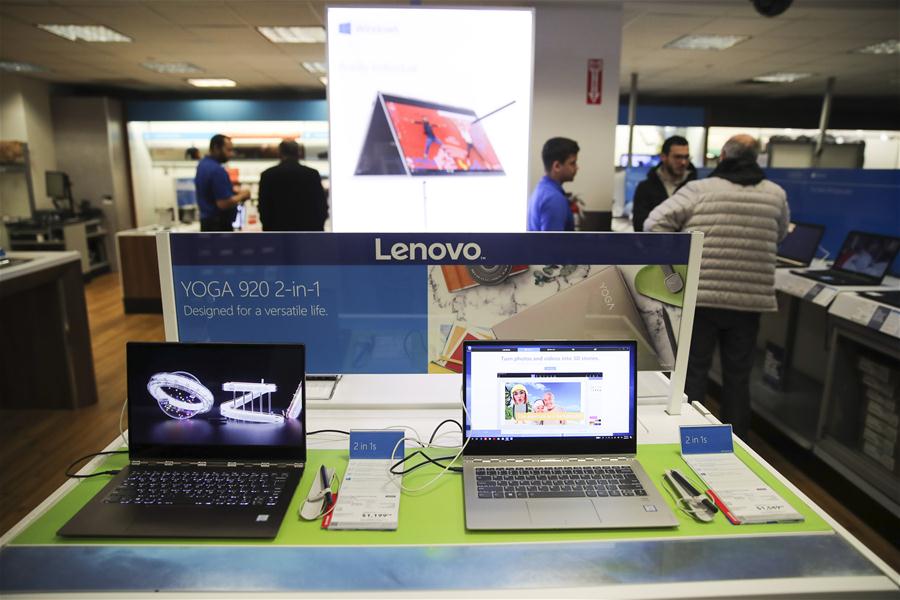
Laptops made in China are on sale at a Best Buy store in New York, the United States, on March 22, 2018. Despite strong warnings from business groups and trade experts, U.S. President Donald Trump on Thursday signed a memorandum that could impose tariffs on up to 60 billion U.S. dollars of imports from China, the latest unilateral move that poses a threat to global trade. (Xinhua/Wang Ying)
WASHINGTON, March 22 (Xinhua) -- Despite strong warnings from business groups and trade experts, U.S. President Donald Trump on Thursday signed a memorandum that could impose tariffs on up to 60 billion U.S. dollars of imports from China, the latest unilateral move that poses a threat to global trade.
Trump has directed U.S. Trade Representative Robert Lighthizer to publish a list of proposed Chinese goods that could be subject to tariffs in 15 days, while the U.S. Treasury Department will have 60 days to propose restrictions on Chinese investment in the United States, according to the presidential memorandum.
The tariffs "could be about 60 billion" dollars, Trump said Thursday at the White House before signing the memorandum. But a senior White House official told reporters earlier in the day that the number would be close to 50 billion dollars.
The memorandum is based on a so-called Section 301 investigation into alleged Chinese intellectual property and technology transfer practices, launched by the Trump administration in August 2017.
China will "take all necessary measures" to defend its rights and interests, an official with the Ministry of Commerce said Thursday, responding to media reports that Washington will soon release results of the investigation.
"China has made clear its position several times that it stands firmly against such unilateral and trade protectionist practices from the U.S. side," the official said.
Section 301, once heavily used in the 1980s and the early 1990s, allows the U.S. president to unilaterally impose tariffs or other trade restrictions on foreign countries. But the United States has rarely used the outdated trade tool since the World Trade Organization (WTO) came into being in 1995.
"It became no longer necessary really for the United States that they have to use that law, because now we have an effective dispute settlement system under the WTO," said Chad Bown, a trade expert and senior fellow at the Washington D.C.-based Peterson Institute for International Economics (PIIE).
The memorandum follows Trump's recent tariff plan on steel and aluminum imports and January's tariffs levied on imported solar panels and washing machines. These unilateral moves have prompted strong opposition and warnings from business groups around the world.
In a letter to Trump on Sunday, 45 U.S. trade associations, representing retail, technology, agriculture and other consumer-product industries, urged the administration not to move forward its tariff plan on Chinese imports, as it would hurt U.S. consumers and companies.
A group of 25 major U.S. retail companies, including Walmart, Costco and Best Buy, also warned on Monday that any additional broad-based tariff would worsen U.S. inequity and "punish American working families" with higher prices on household basics like clothing, shoes and electronics.
If the Trump administration imposes a 25-percent tariff on information and communications technology imports from China, it would cost the U.S. economy 332 billion dollars over the next 10 years, according to a report recently released by the Information Technology and Innovation Foundation, a U.S. technology policy think tank.
"Simply put, tariffs are damaging taxes on American consumers," said Thomas J. Donohue, President and CEO of U.S. Chamber of Commerce, warning the Trump administration's tariff plan could lead to "a destructive trade war" with serious consequences for U.S. economic growth and job creation.
"Tariffs of $30 billion a year would wipe out over a third of the savings American families received from the doubling of the standard deduction in tax reform. If the tariffs reach $60 billion, which has been rumored, the impact would be even more devastating," Donohue said.
Related:
Trump's China tariff plan stokes trade worries, triggers market selloff
WASHINGTON, March 22 (Xinhua) -- Despite strong warnings from business groups and trade experts, U.S. President Donald Trump on Thursday signed a memorandum that could impose tariffs on up to 60 billion U.S. dollars of imports from China, in a unilateral move that triggered market selloff. Full story
China Focus: China to take necessary measures against U.S. protectionism
BEIJING, March 23 (Xinhua) -- China will "take all necessary measures" to defend its rights and interests, an official with the Ministry of Commerce said Thursday, responding to media reports that the United States will soon release results of a Section 301 investigation against China. Full story















